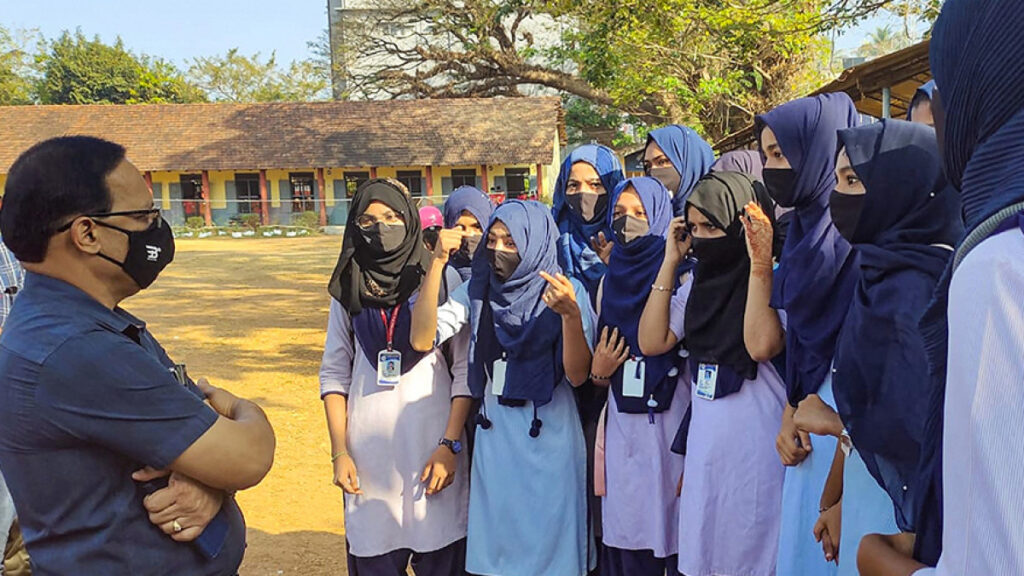‘Hijab’ Row: A Piece Of Cloth, A Gaping Rift
Feb 11, 2022 | Shalini Rai
FILE PHOTO: A faculty member talks with students after the school authorities denied them entry for wearing a 'hijab' in Kundapura of Karnataka's Udupi district (PTI)
Viral visuals of a burqa-clad student named Muskan Khan, enrolled at the Mandya Pre-University college, show her being heckled by a mob of saffron-clad young men, raising slogans of ‘Jai Shri Ram!’ and chasing Muskan as she tries to enter the main building of the college. In response, feisty Muskan shouts back ‘Allah hu Akbar!’
What this incident has succeeded in doing is expose the deep fissures that exist in Indian society. Something which was a non-issue for so long has suddenly been forced into the limelight, even as it divides opinion among members of society and exposes a deep chasm.
Petitioners have approached the Supreme Court challenging the Karnataka High Court’s remarks that educational institutions in the state can open for now but with no religious clothing on campus, for the sake of peace. The affected students have filed a petition in the Karnataka High Court seeking an order that declares wearing ‘hijab’ as their fundamental right. The Karnataka High Court had, on Thursday, restrained students from wearing ‘hijab’ or any religious attire till the matter is pending in court. The next hearing is scheduled to take place on Monday.
This controversy is being viewed through various lenses. Some are calling it a ‘deliberate’ attempt at ‘maligning’ India’s secular credentials while others are terming it part of ‘an elaborate toolkit to divide Indians’. It does not help that this row has afforded India’s antagonists, specifically Pakistan, the opportunity to castigate it and call its secular ethos into question.
Meanwhile, India’s Charge d’Affaires Suresh Kumar has refuted all allegations levelled by the Pakistan Foreign Office over the Karnataka ‘hijab’ controversy. According to sources, the Indian diplomat called Pakistan’s claims “baseless” and conveyed to officials that “India is a secular country”.
Pakistan’s Foreign Minister Shah Mahmood Qureshi also waded into the ongoing ‘hijab’ row on Wednesday, saying that depriving Muslim girls of education is a grave violation of fundamental human rights. However, hitting out at Pakistan, AIMIM chief Asaduddin Owaisi said, “Pakistan should not lecture India on girls’ education. Malala was shot there. They failed to provide security to their girls and are now lecturing India.”
Malala Yousafzai, a Nobel laureate and women’s rights activist, has pitched in too, saying Indian leaders must stop the marginalisation of Muslim women. In a tweet, Malala wrote,”Refusing to let girls go to school in their hijabs is horrifying. Objectification of women persists, for wearing less or more. Indian leaders must stop the marginalisation of Muslim women.”
Subsequently, protests erupted across several districts in Karnataka in the week gone by and police resorted to force to disperse the crowd. Section 144 has been imposed in Davangere, Shimoga and Bagalkot after protesters engaged in stone pelting. Karnataka Chief Minister Basavaraj Bommai has ordered closure of all schools and colleges until the matter is resolved. Karnataka High Court too has urged people to maintain peace.
Meanwhile, wading into the current row carefully, Union Minister Giriraj Singh and Rajya Sabha MP Vinay Sahasrabuddhe have come out in support of a Uniform Civil Code (UCC). “A situation is being created that the UCC has become the need of the hour,” Singh said, calling for “one nation, one law.”
How it would be eventually resolved remains to be seen but what this controversy has certainly done is bring into sharp focus the faultlines within Indian secularism and expose the chinks in the armour of India’s constitutional commitments. Allowing such rows to fester at the local level and spread on the national level will greatly undermine India’s credentials and that will be highly unfortunate.
